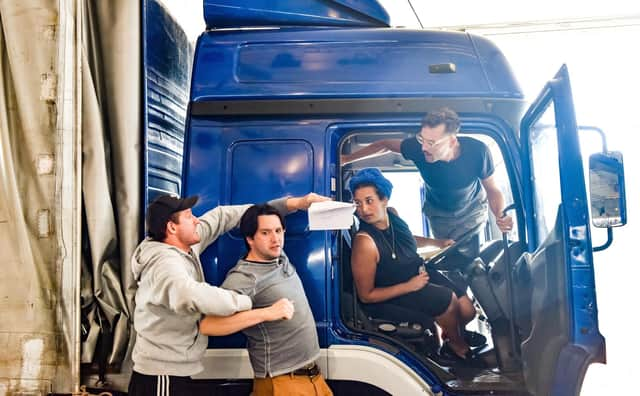Scottish Opera’s Candide: A ‘wear sensible footwear’ kind of show


“You know, people talk about Candide being unstageable.” That’s quite an observation, especially from director Jack Furness, who himself is about to stage Bernstein’s madcap, Voltaire-inspired opera for Scottish Opera.
But you can see what he means. “The plot moves from Germany to Portugal, Paris, Spain, Montevideo, into the jungle, Eldorado, Suriname and Venice. Some of the scenes are really short, so there’s very little time to establish the world the characters are inhabiting at any moment. And there are a whole load of characters, too. Candide is very intricate and quite chaotic – it can feel very confusing.”
Advertisement
Hide AdAdvertisement
Hide AdHowever, this helter-skelter work might just have found something of an ideal setting in Furness’s unconventional production, staged as a promenade performance in a huge tent at the back of Scottish Opera’s Glasgow production studios. Indeed, it marks one of the lasting legacies of the Covid pandemic: the company’s al fresco summer productions might have begun out of necessity (with a heartbreaking, pandemic-themed La bohème from director Roxana Haines in September 2020), but they’re now a firm fixture in Glasgow’s summer calendar.
“And because we’ve got this amazing site,” Furness continues, “we’ve been able to fully embrace the chaos of the plot.” If Bernstein’s title character, together with his beloved Cunegonde, goes on quite an epic journey to discover whether the world really is the utopian place he’s been taught, then so does Furness’s audience – though over more modest distances, admittedly. “You’ll be able to follow Candide to different locations around the performing space,” explains Furness, “and of course we’ll have seating available at those different points. But it’s very much a ‘wear sensible footwear’ kind of show.”
More than that, you may not even be able to tell audience apart from performers. Furness’s production involves not only Scottish Opera’s own 80-strong community chorus, but also performers from Glasgow’s Maryhill Integration Network, which works to bring asylum seekers and refugees together with the city’s residents. “We wanted it to feel like there was a continuum from the audience to the community performers through to the core principal singers, so that the opera is an extension of the community, and embedded within the community too.”
One of the ways Furness plans to achieve that is in staying true to the venue’s surroundings. “The location has this really cool graffiti wall, which we knew we had to integrate. One of our earliest ideas was that we wanted to build a show that feels like this is the only place it could possibly happen, rather than trying to pretend we weren’t in some kind of big lorry park.” Even that, however, fed into Furness’s very contemporary conception of the opera, in which Candide’s worldwide travels line up against the cold realities of global commerce, and the movement of goods and people from one continent to another.
Indeed, despite its catchy showtunes, Candide isn’t the most optimistic of works – which was kind of its point. In his original 1759 satire, Voltaire set out to demonstrate the ridiculousness of fellow philosopher Leibniz’s theory that we’re living in the “best of all possible worlds” – but the results put our hero and heroine through some rather blood-curdling escapades. How did Furness set about transforming the opera’s sometimes rather brutal storyline into something upbeat? “We’ve been trying to access the true spirit of the opera, which I think is about human survival and resilience,” he explains. “It’s about a sense of solidarity – we all know how bad the world can be, but we also know that we can do something about it.”
It’s a busy time for Furness: his Garsington Opera production of Dvořák’s Rusalka arrives at the Edinburgh International Festival just a few days before Candide opens in Glasgow, and he’s also been directing his own company, Shadwell Opera, in a collaboration on Oliver Knussen’s opera Where the Wild Things Are with the Bamberg Symphony Orchestra. Nonetheless, he’s clear about his own role, whatever opera he’s staging. “Even if the work itself isn’t so joyful, it’s got to be done in a spirit of sharing and openness. In everything I’ve done, it’s been about bringing joy.”
Scottish Opera’s Candide opens at New Rotterdam Wharf, 40 Edington Street, Glasgow, on 11 August www.scottishopera.org.uk/shows/candide